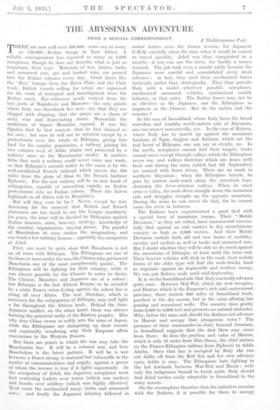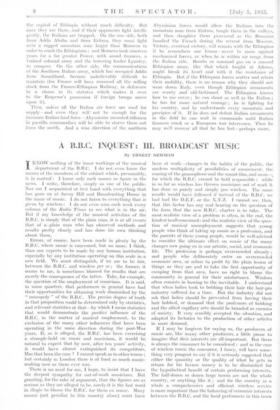THE ABYSSINIAN ADVENTURE
FROM A SPECIAL CORRESPONDENT
A Mediterranean Port.
THERE arc now well over 100,000—some say as many as 150,000—Italian troops in East Africa. A reliable correspondent has reported as many as 1,000 aeroplanes, though he does not describe what is just as important, their type. Materials of war, lorries, tanks and armoured cars, gas and barbed wire, are poured into the Italian colonies every day. Great liners like the ' Rex,' tramps from the River Plate and the Chile trade, British vessels selling for scrap, are organized for the work of transport and transhipment from the Italian coast. Eye-witnesses newly arrived from the two ports of Mogadiscio and ltelassawa—the only points where Italy can disembark her men—say that they are clogged with shipping, that the quays are a chaos of rusty wire and depreciating stores. Meanwhile the ambitions of Signor Mussolini expand. It was the Ogaden that he first wanted—that he first claimed as his own : but now he will not be satisfied except by a protectorate over the whole of Ethiopia, giving him land for his surplus population, a railway joining his two colonies west of Addis Ababa and protected by a military zone on the Manchurian model. It matters little that such' a railway could never carry any trade, or that Ethiopia's natural outlet to the coast is by the well-established French railroad which covers the 500 'miles from the plain of Shoa to the French harbour Djibouti. For the new railway will be an iron band of subjugation, capable of converting rapidly an Italian protectorate into an Italian colony. There the fairest highlands in all Africa will be Mussolini's.
But will they ever be his ? Never, except by war. Assuming for the moment that British and French statesmen are too timid to use the League machinery for peace, the issue will be decided by Ethiopian against Italian finances, arms, bravery, strategy, knowledge of the country, organization, staying power. The parallel of Manchukuo at once strikes the imagination, and can teach a few military lessons : especially the occupation of Jehol.
First, one must be quite clear that Manchuria is not on all fours with Ethiopia. The Ethiopians are one of the bravest races under the sun, the Chinese who garrisoned Manchuria one of the most complacently pacific. The Ethiopians will be fighting for their country, while it was always possible for the Chinese to retire to theirs. The Chinese, Manchus and Japanese are of a colour : but Ethiopia is the last African Empire to be invaded by a white Power, when feeling against the colour bar is rising all over Africa. The war, therefore, which is necessary for the subjugation of Ethiopia, may well light a fire throughout the African bush. Behind the Sino- Japanese conflict, on the other hand, there was always looming the potential unity of the Eastern peoples. Else why does China swoon so softly into the arms of Japan, while the Ethiopians are sharpening up their swords and confusedly wondering why their Emperor offers concessions to the Western Powers.
But there are points in which the war may take the Manchurian line. It will be a colonial war, and here Manchukuo is the latest pattern. It will be a war between a Power strong in material but vulnerable in the matter of communications and supply, against a power of whom the reverse is true if it fights sagaciously. In the occupation of Jehol, the Japanese aeroplanes went first scattering leaflets over towns (which was useless) and bombs over artillery (which was highly effective). Next came the mechanized army, tanks and armoured ears ; and finally the Japanese infantry followed in motor lorries over the frozen terrain, for Japanese G.H.Q. carefully chose the time when it would be easiest to travel speedily. Jehol was thus vanquished in a month, if one can use the term, for hardly a mouse resisted. The job took even a month solely because the Japanese were careful and consolidated every fresh advance ; in fact, they used their mechanized forces tactically rather than strategically. They thus provide Italy with a model—wherever possible, aeroplanes, mechanized armoured vehicles, mechanized mobile infantry, in that order. The Italian forces may not be so effective as the 'Japanese, nor the Ethiopians so impotent as the Chinese. But do the tactics suit the country ?
In the ease of Somaliland, where Italy faces the broad waterless and scrubby south-eastern side of Abyssinia, one can answer unreservedly, yes. In the case of Eritrea, where Italy has to march up against the mountain bastions of Tigre, Gojjam and Amhara, which are the real heart of Ethiopia, one can say as - clearly, no. In the north, aeroplanes cannot find their targets, tanks cannot move except through valleys which the Ethiopians never use, and valleys therefore which are dense with bush and during the rains (which last till September) are seamed with fierce rivers. There are no roads in northern Abyssinia ; when the Ethiopian travels, he goes by narrow mule-track along the mountain tops, shunning the fever-stricken valleys. When he must cross a valley, his mule dives straight down the mountain side and struggles straight up the opposite mountain. During the rains he can never do that, for he cannot cross the river in between.
The Italians have experimented a good deal with a special form of mountain troops. Their " Mobile Divisions," as they are called, have manoeuvred success- fully (but against no real enemy) in dry mountainous country as high as 8,000 metres. And their Mobile Divisions include both old and new forms of mobility, cavalry and cyclists as well as tanks and armoured cars. But I doubt whether they will be able to do much against the mountains of Ethiopia, at least until the rains end. Their heavier vehicles will stick in the mud, their mobile forces of the older type will find the mule-tracks hard to negotiate against an implacable and reckless enemy. We can put Eritrea aside until mid-September. It is on the Somaliland side that Italy can really advance quite soon. Between Wal-Wal, which she now occupies, and Harrar, which is the Emperor's rich and easternmost province, there stretch 300 miles of Somaliland bush, parched in the dry season, but in the rains offering fair grazing and occasional wells. The country rises gently from 8,000 to 6,000 feet and presents no natural obstacles. Why, before the rains end, should the Italians not advance to Harrar and occupy that prosperous town ? The presence of their commander-in-chief, General Graziani, in Somaliland suggests that the first blow may come from there. So does the position and value of Harrar, which is only 85 miles from Dire-Dawa, the chief station on the Franco-Ethiopian railway from Djibouti to Addis Ababa. Once that line is occupied by Italy she can cut Addis off from the Red Sea and her own advance upon Addis is easy. The Ethiopians hate fighting in the hot lowlands between Wal-Wal and Harar : with only the indigenous Somali to brush aside, Italy should find Jehol tactics easily adaptable to Somaliland in the rainy season. On the assumption therefore that the initiative remains with the Italians, it is possible for them to occupy the capital of Ethiopia without much difficulty. But once they are there, and if their opponents fight intelli- gently, the Italians arc trapped. On the one side, both from Addis Ababa and from Eritrea, they must fight over a rugged mountain zone larger than Morocco in order to crush the Ethiopians ; and Morocco took nineteen years for a far greater Power, with sound finances, a trained colonial army and the towering leader Lyautey, to conquer. On the other side, the communications of the Southern Italian army, which has occupied Addis from Somaliland, become unbelievably difficult to maintain (for France will have removed all the rolling stock from the Franco-Ethiopian Railway, in deference to a clause in its statutes which makes it over to the Emperor's possession if foreign troops move upon it).
Then, unless all the Italian air force are used for supply—and even they will' not be enough for the immense Italian land force—Abyssinian mounted riflemen in guerilla commandoes will be able to starve them out 'from the south. And a wise direction of the northern Abyssinian forces would allow the Italians into the mountain zone from Eritrea, tangle them in the valleys, and then slaughter them piecemeal as the Russians handled the French during the retreat from Moscow. Victory, eventual victory, will remain with the Ethiopian if he remembers one leSson—never to mass against mechanized forces, or when he is within air range from the Italian side. Bombs or mustard gas on a massed Ethiopian army, like that which fought at Adowa, might break its heart and with it the resistance of Ethiopia. But if the Ethiopian forces scatter and retain their mobility, there is no reason why they should not wear down Italy, even though Ethiopian armaments are scanty and old-fashioned. The Ethiopian knows how to use cover ; he can shoot as well as the Italian ; he has far more natural .courage ; he is fighting for his country, and he understands every mountain and precipice of it. If he does not defeat Italian armaments in the field he can wait in commando .until Italian finances crack or a European war intervenes. Then he may well recover all that he has lost—perhaps more.















































 Previous page
Previous page